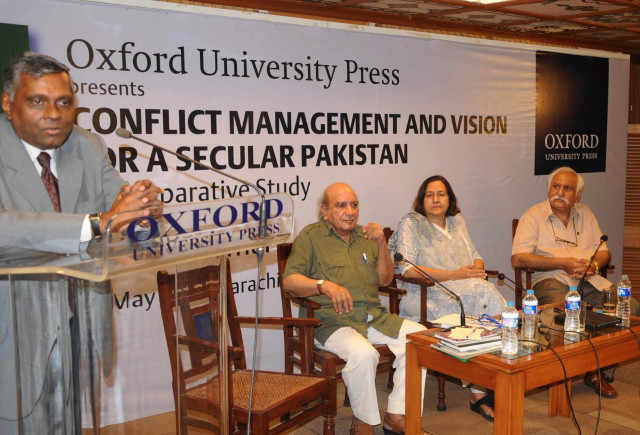Divided we fall: Speakers denounce ruling class for spreading hatred in the name of secularism
The discussion took place during the book launch of Prof Moonis Ahmar's book.

The speakers at the book launch of 'Conflict Management and Vision for a Secular Pakistan: A Comparative Study' on Friday said that secularism is not against Islam and that it has been misunderstood. PHOTO: EXPRESS
The concept of secularism is often misunderstood in the country as not only religion but secularism itself has been exploited by the rulers and certain groups in Pakistan for their vested interests.
The speakers at the book launch of 'Conflict Management and Vision for a Secular Pakistan: A Comparative Study' on Friday said that secularism is not against Islam and that it has been misunderstood.
The book, written by Karachi University's Prof Moonis Ahmar, is the latest publication of the Oxford University Press. It aims to examine the vision of Pakistan as perceived by the founders of the country. It argues that conflicts, particularly those on sectarian and communal levels, can be effectively managed by following a secular approach.
Ahmar pointed out that this would require the adoption of a secular 'toolkit' primarily composed of tolerance, neutrality and freedom in religion, good governance and the rule of law.
"The nation with a population of 180 million is at crossroads," said Prof Ahmar, suggesting several things that can change the fate of the nation, including reforms in education and social economic development. "Development of the country's human resources through education is very important," he added.
The author said that a majority of the people of Pakistan do not have a clear idea of the definition of secularism. "We can't control it now," he said. However, he felt that the elite are to blame for this situation as much as anyone else. "They dress differently but they are just as conservative as the rest," he said.
Prof Ahmar felt that all rulers of the country, both democratic and otherwise, have exploited religion in Pakistan. "Even Zulfikar Ali Bhutto gave a lot of freedom to religio-political parties," he said. "Only a few religio-political parties won seats in the 1970 polls and in the 2002 elections, these parties were able to form the provincial government in Khyber-Pakhtunkhwa." Prof Ahmar felt that the level of religious tolerance has decreased over the years. "In an integrated society, one has to respect the religion of others and should expect them to respect his," he said.
Prof Ahmar felt that there is a lot of confusion in the country, which needs to be addressed as soon as possible. "Our approach is full of contradictions," said Prof Ahmar. "Pakistan is not a failed state and neither is it a failing state, but it is still fragile." He felt that most of the blame lies on the shoulders of those whose responsibility was to deal with state-related matters.
Prof Ahmar was then followed by Human Rights Commission of Pakistan secretary-general I A Rehman, who also discussed secularism in the country. "About 70 years ago, Muslims were nationalists," pointed out Rehman. "We have been discussing secularism since 1947 but haven't understood it yet. Mughals were secular and even the British were secular."
Rehman highlighted the author's comparison of Pakistan to other countries and the overall situation. He felt that thorough discussion is essential to help the country and added that 'Ahmar has initiated it successfully'.
"The ruling class has exploited religion in Pakistan," said author and journalist Babar Ayaz. "Secularism is perceived as anti-religion but it actually isn't. A man's religion is his private affair."
Oxford University Press Pakistan managing director Ameena Saiyid said that she was delighted to launch a book relevant to today's Pakistan. "It is time we put our heads together and carefully evaluate the solutions for stabilising the country during one of its most volatile periods in history."
Published in The Express Tribune, June 1st, 2014.



















COMMENTS
Comments are moderated and generally will be posted if they are on-topic and not abusive.
For more information, please see our Comments FAQ